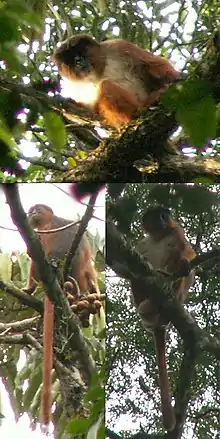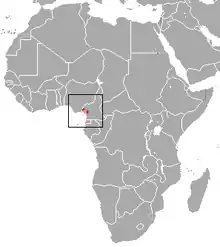Preuss's red colobus
Preuss's red colobus (Piliocolobus preussi) is a red colobus primate species endemic to the Cross-Sanaga Rivers ecoregion. An important population occurs in Korup National Park, Southwest Province, Cameroon, but the species' distribution is localized (groups are frequently encountered near the main tourist camps). The species is considered present in adjacent Cross River National Park - Oban Division in Nigeria[2] and hunter reports suggest that few groups remain in Nkwende Hills and Nta Ali Forest Reserve in the broader Korup region.[3] A population is also present in Ebo forest, Littoral Province of Cameroon.[2]
| Preuss's red colobus[1] | |
|---|---|
 | |
| Scientific classification | |
| Domain: | Eukaryota |
| Kingdom: | Animalia |
| Phylum: | Chordata |
| Class: | Mammalia |
| Order: | Primates |
| Suborder: | Haplorhini |
| Infraorder: | Simiiformes |
| Family: | Cercopithecidae |
| Genus: | Piliocolobus |
| Species: | P. preussi |
| Binomial name | |
| Piliocolobus preussi (Matschie, 1900) | |
 | |
| Preuss's Red Colobus range | |
Conservation status
The Preuss's red colobus is critically endangered according to the IUCN Red List due to hunting pressure and destruction of its habitat. Large portion of the remaining groups are included within protected areas (Korup National Park, Cross River National Park, and the proposed national park at Ebo).[2]
Ecology
Like other colobus monkeys, it is primarily a leaf eater.
Description
Preuss's red colobus has a black head, a black back ticked with orange, and bright red tail, limbs and cheeks.[4]
Taxonomy
Preuss's red colobus has, in the past, been considered a subspecies of P. pennantii and P. badius.[4]
References
- Groves, C. P. (2005). Wilson, D. E.; Reeder, D. M. (eds.). Mammal Species of the World: A Taxonomic and Geographic Reference (3rd ed.). Baltimore: Johns Hopkins University Press. p. 170. ISBN 0-801-88221-4. OCLC 62265494.
- Linder, J.; Morgan, B.J.; Abwe, E.E.; Jost Robinson, C.A.; Imong, I.; Oates, J.F. (2019). "Piliocolobus preussi". IUCN Red List of Threatened Species. 2019: e.T41026A92633245. doi:10.2305/IUCN.UK.2019-3.RLTS.T41026A92633245.en. Retrieved 19 November 2021.
- Astaras, C. (2009). Ecology and Status of the Drill (Mandrillus leucophaeus) in Korup National Park: Implications for Conservation. PhD dissertation, Gerog-August-University of Göttingen, pp. 287.
- Rowe, Noel (1996). The Pictorial Guide to the Living Primates. p. 175.
